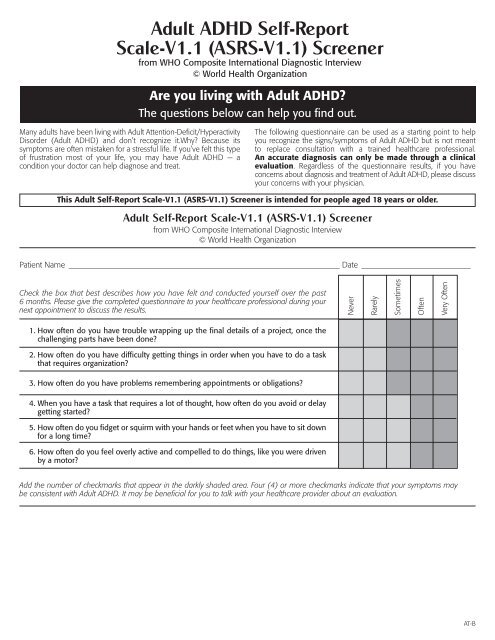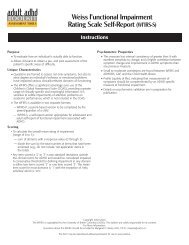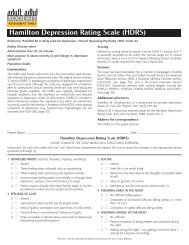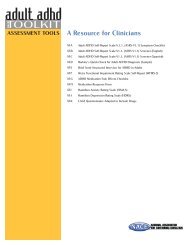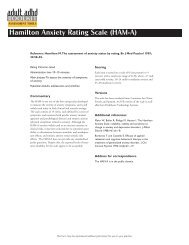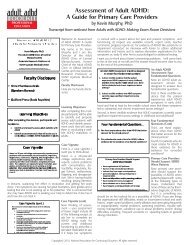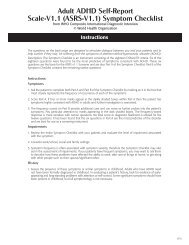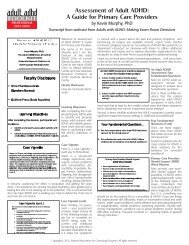Adult ADHD Self-Report Scale-V1.1 (ASRS-V1.1) Screener
Adult ADHD Self-Report Scale-V1.1 (ASRS-V1.1) Screener
Adult ADHD Self-Report Scale-V1.1 (ASRS-V1.1) Screener
Create successful ePaper yourself
Turn your PDF publications into a flip-book with our unique Google optimized e-Paper software.
<strong>Adult</strong> <strong>ADHD</strong> <strong>Self</strong>-<strong>Report</strong><strong>Scale</strong>-<strong>V1.1</strong> (<strong>ASRS</strong>-<strong>V1.1</strong>) <strong>Screener</strong>from WHO Composite International Diagnostic Interview© World Health OrganizationAre you living with <strong>Adult</strong> <strong>ADHD</strong>?The questions below can help you find out.Many adults have been living with <strong>Adult</strong> Attention-Deficit/HyperactivityDisorder (<strong>Adult</strong> <strong>ADHD</strong>) and don’t recognize it.Why? Because itssymptoms are often mistaken for a stressful life. If you’ve felt this typeof frustration most of your life, you may have <strong>Adult</strong> <strong>ADHD</strong> — acondition your doctor can help diagnose and treat.The following questionnaire can be used as a starting point to helpyou recognize the signs/symptoms of <strong>Adult</strong> <strong>ADHD</strong> but is not meantto replace consultation with a trained healthcare professional.An accurate diagnosis can only be made through a clinicalevaluation. Regardless of the questionnaire results, if you haveconcerns about diagnosis and treatment of <strong>Adult</strong> <strong>ADHD</strong>, please discussyour concerns with your physician.This <strong>Adult</strong> <strong>Self</strong>-<strong>Report</strong> <strong>Scale</strong>-<strong>V1.1</strong> (<strong>ASRS</strong>-<strong>V1.1</strong>) <strong>Screener</strong> is intended for people aged 18 years or older.<strong>Adult</strong> <strong>Self</strong>-<strong>Report</strong> <strong>Scale</strong>-<strong>V1.1</strong> (<strong>ASRS</strong>-<strong>V1.1</strong>) <strong>Screener</strong>from WHO Composite International Diagnostic Interview© World Health OrganizationPatient Name ___________________________________________________________________ Date ___________________________Check the box that best describes how you have felt and conducted yourself over the past6 months. Please give the completed questionnaire to your healthcare professional during yournext appointment to discuss the results.NeverRarelySometimesOftenVery Often1. How often do you have trouble wrapping up the final details of a project, once thechallenging parts have been done?2. How often do you have difficulty getting things in order when you have to do a taskthat requires organization?3. How often do you have problems remembering appointments or obligations?4. When you have a task that requires a lot of thought, how often do you avoid or delaygetting started?5. How often do you fidget or squirm with your hands or feet when you have to sit downfor a long time?6. How often do you feel overly active and compelled to do things, like you were drivenby a motor?Add the number of checkmarks that appear in the darkly shaded area. Four (4) or more checkmarks indicate that your symptoms maybe consistent with <strong>Adult</strong> <strong>ADHD</strong>. It may be beneficial for you to talk with your healthcare provider about an evaluation.AT-B
The Value of Screening for <strong>Adult</strong>s with <strong>ADHD</strong>Research suggests that the symptoms of <strong>ADHD</strong> can persist intoadulthood, having a significant impact on the relationships, careers,and even the personal safety of patients who may suffer from it. 1-4Because this disorder is often misunderstood, many people who haveit do not receive appropriate treatment and, as a result, may neverreach their full potential. Part of the problem is that it can be difficultto diagnose, particularly in adults.The <strong>Adult</strong> <strong>ADHD</strong> <strong>Self</strong>-<strong>Report</strong> <strong>Scale</strong> (<strong>ASRS</strong> v1.1) and scoring systemwere developed in conjunction with the World Health Organization(WHO) and the Workgroup on <strong>Adult</strong> <strong>ADHD</strong>, which included thefollowing team of psychiatrists and researchers:Lenard Adler, MDAssociate Professor of Psychiatry and NeurologyNew York University Medical SchoolRonald Kessler, PhDProfessor, Department of Health Care PolicyHarvard Medical SchoolThomas Spencer, MDAssociate Professor of PsychiatryHarvard Medical SchoolAs a healthcare professional, you can use the <strong>ASRS</strong> v1.1 as a tool tohelp screen for adult <strong>ADHD</strong> patients. Insights gained through thisscreening may suggest the need for a more in-depth clinician interview.The questions in the <strong>ASRS</strong> v1.1 are consistent with DSM-IV criteria andaddress the manifestations of <strong>ADHD</strong> symptoms in adults. Content ofthe questionnaire also reflects the importance that DSM-IV places onsymptoms, impairments, and history for a correct diagnosis.The screener takes less than 5 minutes to complete and can providesupplemental information that is critical to the diagnostic process.References:1. Schweitzer, J.B., Cummins, T.K., Kant, C.A. Attention-deficit/hyperactivity disorder.Med Clin North Am. 2001;85(3):10-11, 757-777.2. Barkley, R.A. Attention deficit hyperactivity disorder: a handbook for diagnosisand treatment (2nd ed.). 1998.3. Biederman, J., Faraone, S.V., Spencer, T., Wilens, T., Norman, D., Lapey, K. A, et al.Patterns of psychiatric comorbidity, cognition, and psychosocial functioning inadults with <strong>ADHD</strong>. Am J Psychiatry. 1993:150:1792-1798.4. American Psychiatric Association. Diagnostic and statistical manual of mentaldisorders, (4th ed., text revision). Washington, DC. 2000:85-93.© World Health OrganizationThe World Health Organization (WHO) does not endorseany specific companies, products or services.


